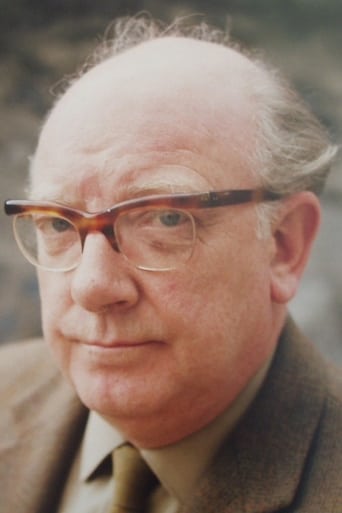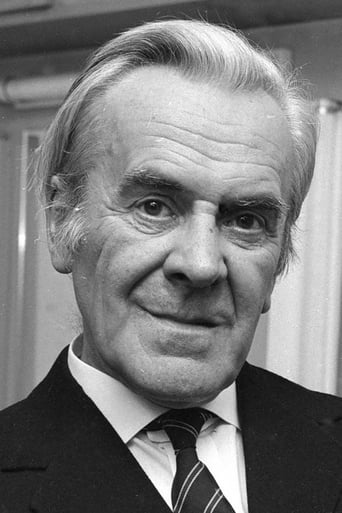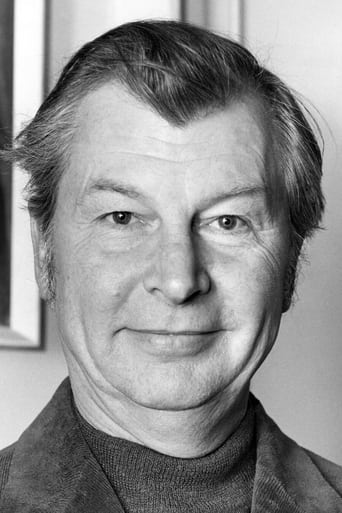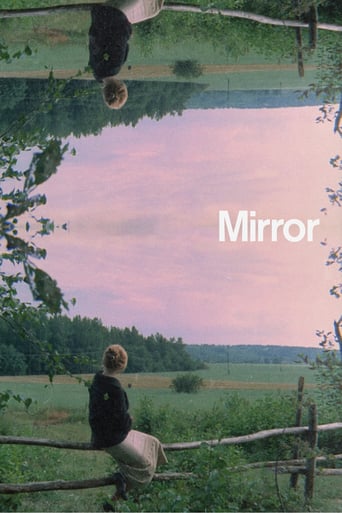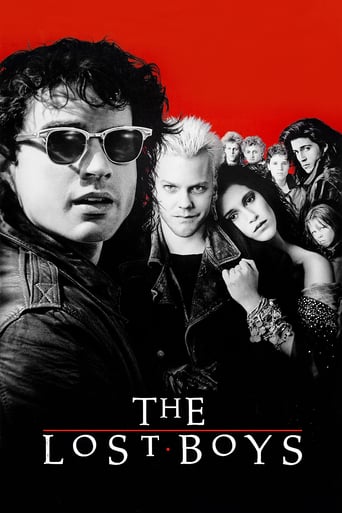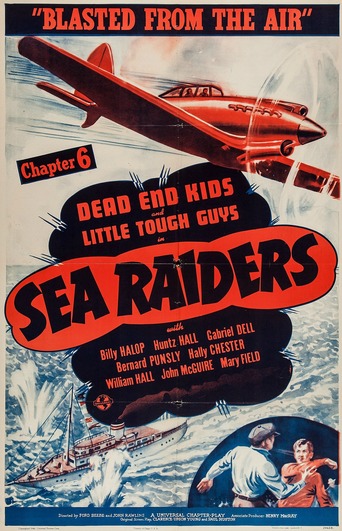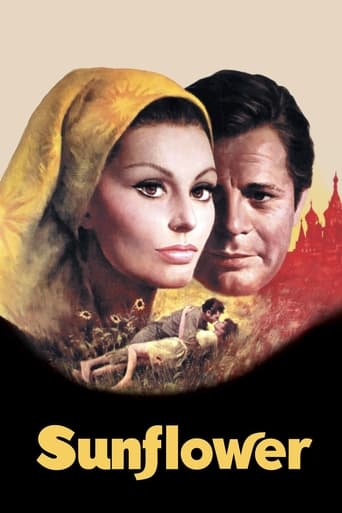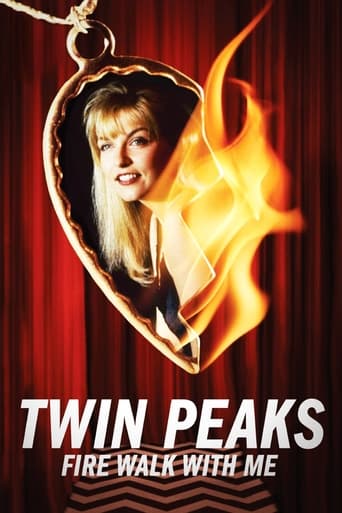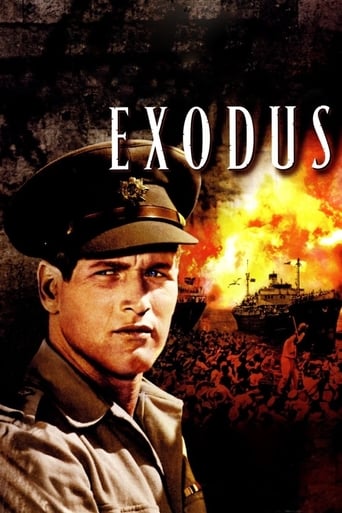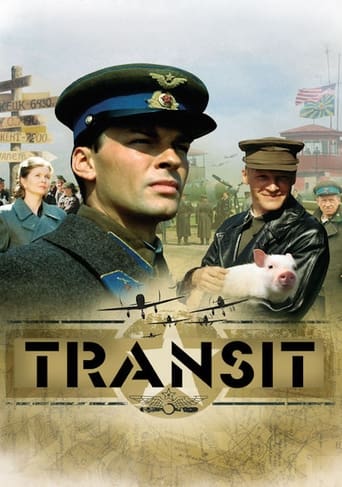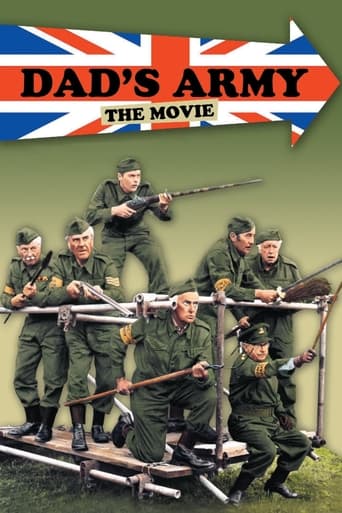
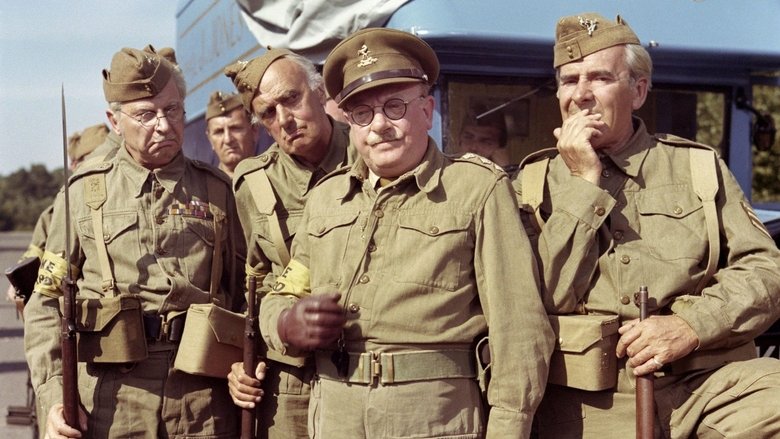
Dad's Army (1971)
Dad's Army was a 1971 feature film based on the BBC television sitcom Dad's Army. Directed by Norman Cohen, it was filmed between series three and four and was based upon material from the early episodes of the television series. The film told the story of the Home Guard platoon's formation and their subsequent endeavours at a training exercise.
Watch Trailer
Cast


Similar titles
Reviews
Such a frustrating disappointment
Best movie ever!
Like the great film, it's made with a great deal of visible affection both in front of and behind the camera.
It is an exhilarating, distressing, funny and profound film, with one of the more memorable film scores in years,
If you have never seen the TV series, or you want to know how it all started, then watch this comedy film. Basically Captain George Mainwaring (Arthur Lowe) sets up the World War II home guard from many volunteer Walmington-on-Sea town residents, including Sgt. Arthur Wilson (John Le Mesurier), LCpl. Jack Jones (Clive Dunn), Pte. James Frazer (John Laurie), Pte. Joe Walker (James Beck), Pte. Charles Godfrey (Arnold Ridley) and Pte. Frank Pike (Ian Lavender). The story basically sees the clumsy, near-witless and always enjoyable troops tackling the Nazi invasion of their town, and they go through many amusing slapstick moments to try and stop them. Also starring Liz Fraser as Mavis Pike, Bernard Archard as Maj. Gen. Fullard, Derek Newark as Regimental Sergeant-Major, Bill Pertwee (Jon's brother) as A.R.P. Warden Hodges, Frank Williams as Vicar, Edward Sinclair as Mr. Yeatman the Verger, Anthony Sagar as Police sergeant and Pat Coombs as Mrs. Hall. The programme was number 4 on Britain's Best Sitcom, Captain Mainwaring was number 29 on The World's Greatest Comedy Characters, and he was number 21 on The 100 Greatest TV Characters, the Christmas Special (My Brother & I) was number 46 on The 100 Greatest Christmas Moments, and the programme was number 13 on The 100 Greatest TV Programmes. Worth watching!
The 1970s are often regarded as a golden age of British television comedy, a period which saw numerous classic sitcoms as well as sketch shows such as "Monty Python's Flying Circus". The period was, however, emphatically not a golden age of British film comedy, and what worked well on television rarely transferred successfully to the big screen. The most triumphant exceptions to this rule were provided by the Pythons, but their best films ("Monty Python and the Holy Grail" and "Life of Brian") were very different in conception to their TV show.The main problem with adapting sitcoms for the cinema is that concepts devised to fit the BBC's 30 minute slots (25 minutes on ITV, which has to find room for commercials) do not always work as well when expanded into a feature film three or four times as long. Few people will remember the film versions of, say, "Up Pompeii!" or "Steptoe and Son" with the same affection as the television versions. In the case of many classic TV comedy shows ("Some Mothers Do 'Ave 'Em", "Yes, Minister", "Fawlty Towers", "The Goodies") no attempt was made to film them at all, for which we can be grateful. Characters such as Michael Crawford's Frank Spencer or John Cleese's Basil Fawlty can be hilarious in half-hour doses, but I doubt if they would remain as funny over two hours. One comedy programme (albeit a dramatisation of a comic novel rather than a sitcom in the normal sense) which might have worked in the cinema was "The Fall and Rise of Reginald Perrin", but any hopes of a film were dashed by the tragically early death of its star Leonard Rossiter."Dad's Army" was one of the few television sitcoms of the period which was turned into a decent film. (About the only other one I can think of was "Porridge"). This was possibly because it had an unusually large number of well-developed characters and derived most of its humour from the interactions between them. The original sitcom ran between 1968 and 1977 and told of the misadventures of a Home Guard platoon in the small seaside town of Walmington-on-Sea. (The Home Guard, initially known as the Local Defence Volunteers, was an auxiliary militia during World War II made up, for the most part, of men too old to serve in the regular forces). The film version is a three-act drama. Act I deals with the formation of the platoon and the recruitment of its members. In Act II they cause havoc during an Army training exercise. In Act III they succeed in capturing a group of Nazi airmen whose plane has been shot down.The three key players in this drama are the platoon's commander, Captain George Mainwaring (Arthur Lowe), and his two subordinates Sergeant Arthur Wilson (John Le Mesurier) and Corporal Jack Jones (Clive Dunn). Mainwaring, who in civilian life is the local bank manager, is a fussy little man, peering at the world through a pair of thick spectacles. It is he who takes the initiative in forming the Home Guard unit and who appoints himself its commander. He is pompous, officious, with an exaggerated sense of his own importance and of his own powers of leadership, the sort of man who does not suffer fools gladly. (And in George Mainwaring's world-view the term "fool" covers most of the rest of the human race). He does, however, have his good qualities. He is motivated by a genuine patriotic idealism and is capable of great physical courage, shown in his encounter with the Germans.Wilson is Mainwaring's deputy at the bank. The two men are very different in character, something emphasised by a difference in appearance, Wilson being tall and thin whereas Mainwaring is short and stout. He comes across as being both more intelligent and better educated than his boss. (His accent suggests he may be a former public schoolboy). Nevertheless, he has ended up playing second fiddle both in civilian and military life, probably because he has the sort of passive personality which leads to pessimism and defeatism and an inability to take anything altogether seriously. Jones is an old soldier who now runs the local butcher's shop. (His promotion to Corporal is due mainly to his ability to bribe Mainwaring with black market sausages). His enthusiasm for his new role is matched only by his incompetence and ability to cause chaos. Although his catchphrase is "Don't panic!" he is prone to panicking at any given opportunity.Several other members of the platoon are featured. Private Fraser, the dour Scottish undertaker, is even more of a pessimist than Wilson. (Catchphrase: "We're doomed, man, DOOMED!"). Private Godfrey is a gentle old man whose main concern is the whereabouts of the nearest lavatory. Private Walker is a sharp Cockney spiv and Private Pike (another bank employee) a spoilt mummy's boy. (Pike's mother is Wilson's mistress, although Wilson tries to keep this liaison secret from the disapproving Mainwaring). Two significant outsiders are the mild-mannered Vicar and the ARP warden, Mainwaring's detested enemy and quite his equal in pompousness and officiousness.There are occasional bawdy doubles entendres ("Keep your hands off my privates"- Mainwaring is ostensibly referring to those soldiers who hold that rank), more so than in the television show which was surprisingly free of innuendo. (Its creators, David Croft and Jimmy Perry, would later go on to create comedy shows such as "Are You Being Served?" and "Hi-de-hi" which were notorious for suggestive humour). The film does, however, preserve much of the mixture of gentle wit, nostalgia and sharp characterisation which made the TV series so successful. 7/10
This is just like the classic TV comedy , in fact it`s exactly like the classic TV comedy and your opinion of this film version all comes down to what you thought of the show . My own opinion is that it`s a little bit too gentle for my taste , but unlike many film spin offs from TV shows at least it`s recognisable with the characters played by the same actors who played them on television , compare this with the big screen versions of THE FUGITIVE , LOST IN SPACE etc The film is basically split into three parts . The first part sets up the formation of the home guard platoon , the continuity here differs slightly from the first episode broadcast in 1968 but it is rather similar to the original episode , the second part features the platoon going on a training excersise while the third part features a hostage situation with some downed Luftwaffe crew . I don`t know if it`s coincidence but the best remembered episode of the series was the one featuring a U-Boat crew in a hostage situation , the two plots are very very similar .So to sum up if you loved the BBC`s DADS ARMY you`ll certainly like this film version
TV shows from the 1970's which were turned into films were usually terrible. Dad's Army is the big exception. The formula from the TV show worked just as well on the big screen and with the bigger budget it's lovely to see people walking around Walmington-on-Sea. The plot is similar to parts of some of the TV episodes, but that doesn't matter because they're still as funny. Other parts like when Mainwaring, Wilson and Frazer are stranded on the raft are classic. The only thing I can criticise it for is the sometimes obvious lack of input from the TV shows creators and writers, Jimmy Perry and David Croft. But beautiful performances from Arthur Lowe, John Le Mesurier, Clive Dunn etc.


